Pro Hamas in the west - and their adventures
- Thread starter mandrill
- Start date
The kids know what's going on now like they did in 1968.These kids have no idea what they’re doing and are brainwashed. They’re using their mom and dad’s hard earned money to ruin the access to education of their fellow students.
Didn't happen, there were other doors the kid could have used.I’m sorry but denying a student to pass just because he’s Jewish is not right. They’re destroying the insides of school buildings and desecrating school grounds. There’s nothing peaceful about many of these protests.
its very easy to end the protests.
That's all they are calling for.
You only don't tell the truth.I don't lie here, hammy, you know that.
zionists in the west bank, where there are no HamasYou only tell the truth.
The students are all calling for BDS.
EXPLOITING FEELING SAFE/CAMPUS SECURITY AS A CHOKE COLLAR ON STUDENT PROTESTS???The students are all calling for BDS.

Academic rigour, journalistic flair
- Podcasts
- Arts
- Business + Economy
- Culture + Society
- Education
- Environment + Energy
- Health
- Politics
- Science + Tech
- En français
Protesters gather in an encampment set up on the University of Toronto campus in Toronto on May 2, 2024. THE CANADIAN PRESS/Christopher Katsarov
Debates on campus safety in response to Palestine solidarity activism show we need strategies to navigate discomfort
Published: May 3, 2024 5.27pm EDT
Authors
 Natalie Kouri-Towe
Natalie Kouri-Towe
Associate Professor, Simone de Beauvoir Institute, Concordia University Sara Matthews
Sara Matthews
Associate Professor, Department of Global Studies, Wilfrid Laurier University
Natalie Kouri-Towe receives funding from the Social Sciences and Humanities Research Council of Canada, the Fonds de recherche – Société et culture, and the Federation for the Humanities and Social Sciences.
Sara Matthews receives funding from the Social Sciences and Humanities Research Council of Canada, and the Fonds de recherche – Société et culture.
Partners
View attachment 1714823550329.gif
Concordia University provides funding as a founding partner of The Conversation CA.
Universitié Concordia provides funding as a founding partner of The Conversation CA-FR.
View all partners

We believe in the free flow of information
Republish our articles for free, online or in print, under Creative Commons licence.
Republish this article
X (Twitter)
Facebook1
Canada’s House of Commons Standing Committee on Justice and Human Rights will soon begin hearings on antisemitism and Islamophobia. The process comes partly in response to claims that university and college campuses are unsafe spaces.
With student protests — including at the University of Toronto and University of British Columbia — pressuring institutions to divest from Israeli militarization, the question of safety has come under scrutiny.
In Québec, a recent injunction request to clear a student encampment at McGill University was rejected by a Superior Court judge who ruled that “the plaintiffs have not personally been subjected to harassment … and their fears are for the most part subjective and based on isolated events.”
How we respond to concerns about student safety can set the stage for learning or encourage its opposite: divisiveness and censorship.
Our mission is to share knowledge and inform decisions.
About us
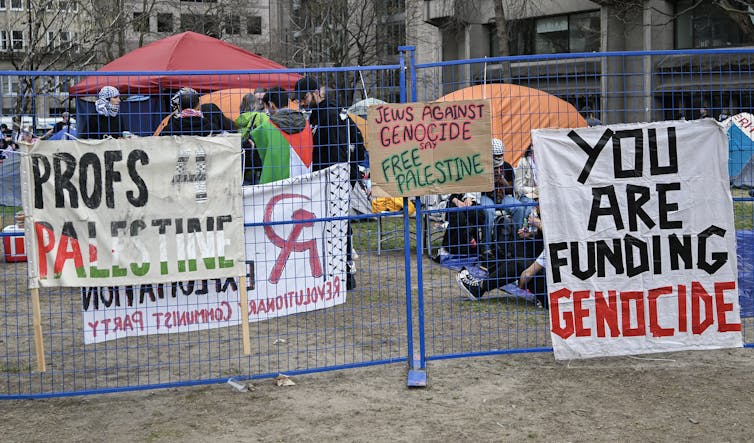
Signs and banners are shown attached to a fence next to a pro-Palestinian demonstration at an encampment at McGill University in Montréal, April 27, 2024. THE CANADIAN PRESS/Graham HughesPolitical expression on campuses
Across North America, there has been a chilling effect on political expression related to the war in Gaza and Palestine solidarity activism.
In the United States, campus events have been cancelled, students have been suspended and faculty have faced censure.
Educational institutions seem to be in crisis. Police response to campus protests, including the arrests of students and faculty, has left many questioning their right to free expression.
We are wary, however, of how the language of “safety” is being used in the Canadian context to justify government interventions into campus affairs. In Ontario, this is evident with the proposed Bill 166, the Strengthening Accountability and Student Supports Act, which aims to support student safety. The bill would empower the minister to influence the content of anti-racism and mental health policies, a move that faculty unions say could threaten academic freedom.
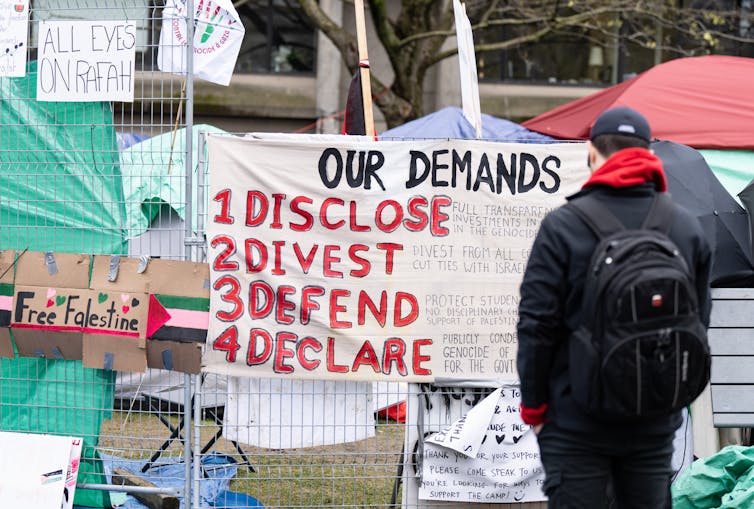
A man reads a sign of demands posted outside a pro-Palestinian encampment set up on McGill University’s campus in Montréal, April 30, 2024. THE CANADIAN PRESS/Christinne MuschiGoverning safety in Canada
The modern concept of public safety has its roots in national security legislation crafted during the First World War. The War Measures Act of 1914 allowed the government to move quickly in matters of security by skirting normal parliamentary processes. The cost, however, was widespread arrests and detention, including the internment of over 8,000 “enemy aliens.”
During the Cold War, these sweeping powers were used to monitor civil rights activists, feminists, communists, sexual minorities and others deemed security threats.
The current Emergencies Act leans on the same pre-emptive powers to guarantee “a safe and secure Canada and strong and resilient communities.” Its use, however, remains controversial.
On campuses and in classrooms across Canada, the language of safety is being used to police teaching about Palestine. Terms such as “genocide” and “settler colonialism,” important to classroom discussions about war and conflict, are now considered risky.
So what does it mean when students say they feel unsafe in classrooms and on campuses when faced with discussions of Israel and Palestine?
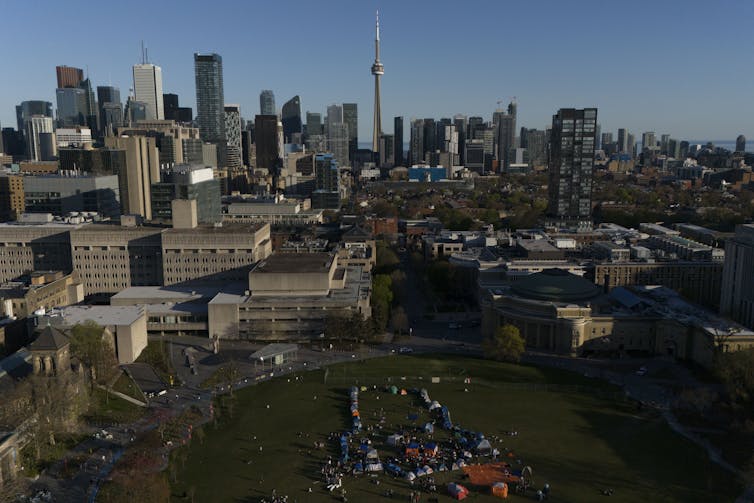
Protesters gather in an encampment set up on the University of Toronto campus in Toronto on May 2, 2024. THE CANADIAN PRESS/Christopher KatsarovSafety is more than a feeling
Hate and violence has no place in our educational system. Teachers and students must be safe from harm. Antisemitism, Islamophobia and anti-Palestinian racism are part of the wider problem of racism in Canadian universities and colleges. Separating these forms of discrimination makes them more difficult to combat because racism is a structural issue.
Educational institutions have robust policies and practices that prohibit hate speech and discrimination while protecting free expression. However, in a climate of reduced funding for anti-racism work on campuses, politicians are magnifying perceived feelings of unsafety to justify government intervention.
In a recent post, Member of Parliament Anthony Housefather called on McGill University campus administrators to seek police assistance in response to the student encampment at the university. Yet, a police spokesperson affirmed that “no crime is being committed.”
Such an approach escalates division instead of helping to resolve it.
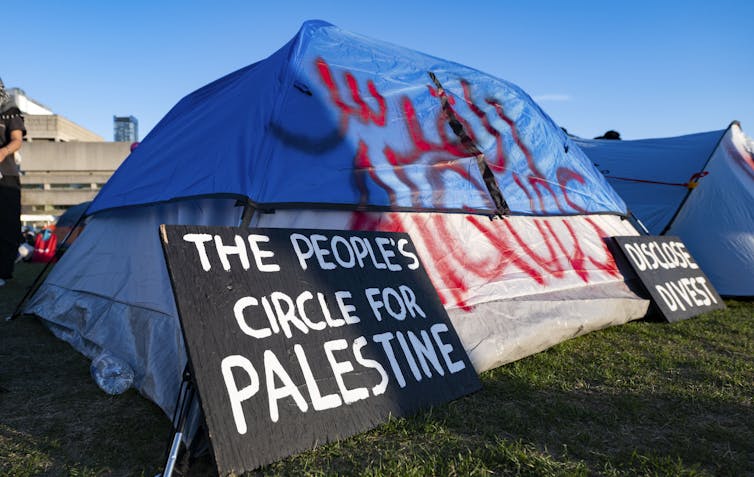
Protesters gather in an encampment set up on the University of Toronto campus in Toronto on May 2, 2024. THE CANADIAN PRESS/Christopher KatsarovStrategies to tolerate political differences
Rather than invite police intervention on campuses or government interference in school policies, what we really need are strategies to hold space for differences, even when they challenge our understanding of the world.
Teachers and students, both inside and outside the classroom, need to be empowered to face difficult questions. This includes examining how our institutions are implicated in the dynamics of war and genocide.
As our decades of teaching courses on conflict and war reveal, it is normal for students to feel discomfort when learning about violence and its devastating effects. Feeling uncomfortable however, is not the same as being unsafe. Building our capacity to reflect on and examine uncomfortable feelings matters if we hope to challenge and transform the conditions that shape violence.
While some suggest a return to civility or campus dialogue is a better way forward, our experience shows that what we really need are tools for working through discomfort and heightened emotions.
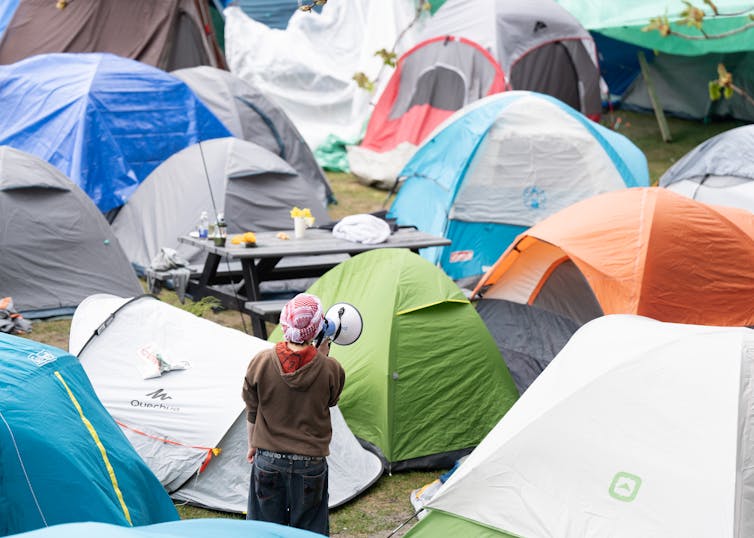
An activist uses a megaphone within a pro-Palestinian encampment set up on McGill University’s campus in Montréal, April 30, 2024. THE CANADIAN PRESS/Christinne MuschiInsight from research on trigger warnings
Trigger warnings involve the practice of providing advance notice of classroom topics that may bring up uncomfortable emotions or traumatic responses. Their use highlights how we might better prepare students for unsettling discussions and respond to their feelings of unsafety.
Research conducted on trigger warnings demonstrates they do little to reduce post-traumatic experiences. Yet, other scholars argue that what these debates signal is a wider need in classrooms to discuss power and violence.
An early analysis of a national survey with faculty and students on trigger warnings in Canada, by Natalie Kouri-Towe — one of the authors of this story — and a team of researchers, indicates that how we respond to and navigate emotional dynamics in education might be more important than giving a warning.
Indeed, researchers have argued that a more holistic approach to student learning is necessary, a view that is supported by some of our research.
In a study exploring creative approaches to challenging classroom conversations, students used photography to reflect on their emotional experiences. The result was new forms of expression and shared understanding.
These findings illustrate the power of using a variety of strategies to engage difficult subject matter.
From safety to freedom
The focus on safety detracts from the real issues at stake in higher education: protecting a diversity of thought, perspectives and speech. To accomplish this, we must equip people with the ability to work through political differences.
With respect to learning, what feels uncomfortable might not always be a threat. It may be that what students need is reassurance that their perspectives are valid and opportunities to express themselves in productive ways.
We believe educational solutions are the answer to the crises that arise during global conflicts. Using the same approaches that we equip our students with, what Canadian society needs are the strategies and confidence to face conflicting worldviews.
Angry Alumn Challenges Chancellor Block, UCLAEXPLOITING FEELING SAFE/CAMPUS SECURITY AS A CHOKE COLLAR ON STUDENT PROTESTS???
Academic rigour, journalistic flair
- Podcasts
- Arts
- Business + Economy
- Culture + Society
- Education
- Environment + Energy
- Health
- Politics
- Science + Tech
- En français
Protesters gather in an encampment set up on the University of Toronto campus in Toronto on May 2, 2024. THE CANADIAN PRESS/Christopher Katsarov
Debates on campus safety in response to Palestine solidarity activism show we need strategies to navigate discomfort
Published: May 3, 2024 5.27pm EDT
Authors
Disclosure statement
Natalie Kouri-Towe
Associate Professor, Simone de Beauvoir Institute, Concordia UniversitySara Matthews
Associate Professor, Department of Global Studies, Wilfrid Laurier University
Natalie Kouri-Towe receives funding from the Social Sciences and Humanities Research Council of Canada, the Fonds de recherche – Société et culture, and the Federation for the Humanities and Social Sciences.
Sara Matthews receives funding from the Social Sciences and Humanities Research Council of Canada, and the Fonds de recherche – Société et culture.
Partners
View attachment 321853
Concordia University provides funding as a founding partner of The Conversation CA.
Universitié Concordia provides funding as a founding partner of The Conversation CA-FR.
View all partners

We believe in the free flow of information
Republish our articles for free, online or in print, under Creative Commons licence.
Republish this article
X (Twitter)
Facebook1
Canada’s House of Commons Standing Committee on Justice and Human Rights will soon begin hearings on antisemitism and Islamophobia. The process comes partly in response to claims that university and college campuses are unsafe spaces.
With student protests — including at the University of Toronto and University of British Columbia — pressuring institutions to divest from Israeli militarization, the question of safety has come under scrutiny.
In Québec, a recent injunction request to clear a student encampment at McGill University was rejected by a Superior Court judge who ruled that “the plaintiffs have not personally been subjected to harassment … and their fears are for the most part subjective and based on isolated events.”
How we respond to concerns about student safety can set the stage for learning or encourage its opposite: divisiveness and censorship.
Our mission is to share knowledge and inform decisions.
About us
Signs and banners are shown attached to a fence next to a pro-Palestinian demonstration at an encampment at McGill University in Montréal, April 27, 2024. THE CANADIAN PRESS/Graham HughesPolitical expression on campuses
Across North America, there has been a chilling effect on political expression related to the war in Gaza and Palestine solidarity activism.
In the United States, campus events have been cancelled, students have been suspended and faculty have faced censure.
Educational institutions seem to be in crisis. Police response to campus protests, including the arrests of students and faculty, has left many questioning their right to free expression.
We are wary, however, of how the language of “safety” is being used in the Canadian context to justify government interventions into campus affairs. In Ontario, this is evident with the proposed Bill 166, the Strengthening Accountability and Student Supports Act, which aims to support student safety. The bill would empower the minister to influence the content of anti-racism and mental health policies, a move that faculty unions say could threaten academic freedom.

A man reads a sign of demands posted outside a pro-Palestinian encampment set up on McGill University’s campus in Montréal, April 30, 2024. THE CANADIAN PRESS/Christinne MuschiGoverning safety in Canada
The modern concept of public safety has its roots in national security legislation crafted during the First World War. The War Measures Act of 1914 allowed the government to move quickly in matters of security by skirting normal parliamentary processes. The cost, however, was widespread arrests and detention, including the internment of over 8,000 “enemy aliens.”
During the Cold War, these sweeping powers were used to monitor civil rights activists, feminists, communists, sexual minorities and others deemed security threats.
The current Emergencies Act leans on the same pre-emptive powers to guarantee “a safe and secure Canada and strong and resilient communities.” Its use, however, remains controversial.
On campuses and in classrooms across Canada, the language of safety is being used to police teaching about Palestine. Terms such as “genocide” and “settler colonialism,” important to classroom discussions about war and conflict, are now considered risky.
So what does it mean when students say they feel unsafe in classrooms and on campuses when faced with discussions of Israel and Palestine?

Protesters gather in an encampment set up on the University of Toronto campus in Toronto on May 2, 2024. THE CANADIAN PRESS/Christopher KatsarovSafety is more than a feeling
Hate and violence has no place in our educational system. Teachers and students must be safe from harm. Antisemitism, Islamophobia and anti-Palestinian racism are part of the wider problem of racism in Canadian universities and colleges. Separating these forms of discrimination makes them more difficult to combat because racism is a structural issue.
Educational institutions have robust policies and practices that prohibit hate speech and discrimination while protecting free expression. However, in a climate of reduced funding for anti-racism work on campuses, politicians are magnifying perceived feelings of unsafety to justify government intervention.
In a recent post, Member of Parliament Anthony Housefather called on McGill University campus administrators to seek police assistance in response to the student encampment at the university. Yet, a police spokesperson affirmed that “no crime is being committed.”
Such an approach escalates division instead of helping to resolve it.

Protesters gather in an encampment set up on the University of Toronto campus in Toronto on May 2, 2024. THE CANADIAN PRESS/Christopher KatsarovStrategies to tolerate political differences
Rather than invite police intervention on campuses or government interference in school policies, what we really need are strategies to hold space for differences, even when they challenge our understanding of the world.
Teachers and students, both inside and outside the classroom, need to be empowered to face difficult questions. This includes examining how our institutions are implicated in the dynamics of war and genocide.
As our decades of teaching courses on conflict and war reveal, it is normal for students to feel discomfort when learning about violence and its devastating effects. Feeling uncomfortable however, is not the same as being unsafe. Building our capacity to reflect on and examine uncomfortable feelings matters if we hope to challenge and transform the conditions that shape violence.
While some suggest a return to civility or campus dialogue is a better way forward, our experience shows that what we really need are tools for working through discomfort and heightened emotions.

An activist uses a megaphone within a pro-Palestinian encampment set up on McGill University’s campus in Montréal, April 30, 2024. THE CANADIAN PRESS/Christinne MuschiInsight from research on trigger warnings
Trigger warnings involve the practice of providing advance notice of classroom topics that may bring up uncomfortable emotions or traumatic responses. Their use highlights how we might better prepare students for unsettling discussions and respond to their feelings of unsafety.
Research conducted on trigger warnings demonstrates they do little to reduce post-traumatic experiences. Yet, other scholars argue that what these debates signal is a wider need in classrooms to discuss power and violence.
An early analysis of a national survey with faculty and students on trigger warnings in Canada, by Natalie Kouri-Towe — one of the authors of this story — and a team of researchers, indicates that how we respond to and navigate emotional dynamics in education might be more important than giving a warning.
Indeed, researchers have argued that a more holistic approach to student learning is necessary, a view that is supported by some of our research.
In a study exploring creative approaches to challenging classroom conversations, students used photography to reflect on their emotional experiences. The result was new forms of expression and shared understanding.
These findings illustrate the power of using a variety of strategies to engage difficult subject matter.
From safety to freedom
The focus on safety detracts from the real issues at stake in higher education: protecting a diversity of thought, perspectives and speech. To accomplish this, we must equip people with the ability to work through political differences.
With respect to learning, what feels uncomfortable might not always be a threat. It may be that what students need is reassurance that their perspectives are valid and opportunities to express themselves in productive ways.
We believe educational solutions are the answer to the crises that arise during global conflicts. Using the same approaches that we equip our students with, what Canadian society needs are the strategies and confidence to face conflicting worldviews.
It's a really bad look for UCLA when its chancellor lets rampaging zionist thugs from off-campus attack peaceful protesters with makeshift clubs, chemical agents and explosives for almost four hours before asking police to intervene, and then has the victims of the violence arrested the next day.
Were any of the zionist thugs arrested the night before? Apparently not.
Block revealed his biased, pro-genocide political sympathies when put his foot down on the side of violent, zionist thugs. He is a disgrace who has shamed UCLA.
As a UCLA graduate in the class of 1981, I am appalled at what the university I love has come to.
Block should face a vote of confidence by faculty. He should also resign even before that happens. Whatever else he achieved in all his years as chancellor, unambiguously supporting pro-genocide thuggery is what he will always be remembered for.
As it is, Commencement is going to be interesting. I doubt Block will have the backbone to show his face. But if he does, UCLA students will know what to do.
Great Judge. Make them pay.
Judge denies request to lift ban on ASU students suspended for anti-Israel protests: report
Approximately 72 individuals were arrested on the Arizona State University campus last month when police swept an encampment
A judge in Arizona has denied a motion that would have lifted the suspension of twenty students arrested last week amid anti-Israel protests.
The U.S. District Court for the District of Arizona denied the Arizona State University students' motion to have their college suspensions lifted on Friday, according to local outlet ABC 15.
The defendants filed the lawsuit against the Arizona Board of Regents on Tuesday, alleging that their suspension from ASU is causing "irreparable harm" due to their inability to enroll in classes.
The students, who are charged with trespassing, also alleged that the suspensions violate their First Amendment rights.
Approximately 72 individuals were arrested on Apr. 26 and taken into custody while continuing protests on the Arizona State University campus.
Police officers cleared the Old Main lawn area overnight — those arrested included both students and faculty.
Judge John Tuchi ruled that the students did not provide sufficient evidence that their First Amendment rights had been violated.
He also ruled that there was insufficient evidence that the university's suspension of students was causing "irreparable harm." The trespassing charges at the heart of the lawsuit have yet to be brought to court.
Students and faculty have demanded the university drop any charges against the protesters with ongoing demonstrations since the arrests.
Another institution of higher learning in the state — the University of Arizona — is embroiled in its own struggle to suppress protesters occupying areas of the campus.
University president Robert C. Robbins said in a May 1 statement that he directed university officials, campus police, Tucson Police and the Pima County Sheriff's Office to "immediately enforce campus use policies and all corresponding laws without further warning."
State troopers were seen on campus with pepper ball guns and gas masks. Demonstrators were initially given a 10:30 p.m. deadline to leave or face arrest, although arrests did not begin until much later.
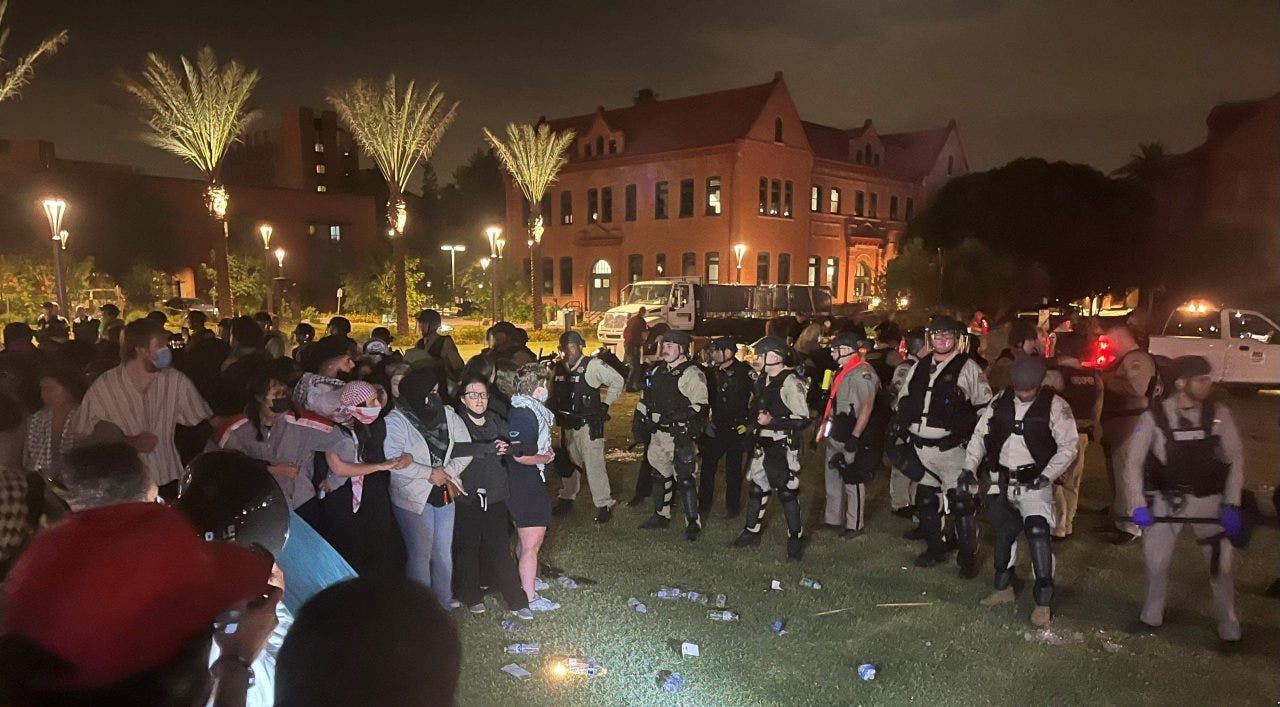
 www.foxnews.com
www.foxnews.com
Judge denies request to lift ban on ASU students suspended for anti-Israel protests: report
Approximately 72 individuals were arrested on the Arizona State University campus last month when police swept an encampment
A judge in Arizona has denied a motion that would have lifted the suspension of twenty students arrested last week amid anti-Israel protests.
The U.S. District Court for the District of Arizona denied the Arizona State University students' motion to have their college suspensions lifted on Friday, according to local outlet ABC 15.
The defendants filed the lawsuit against the Arizona Board of Regents on Tuesday, alleging that their suspension from ASU is causing "irreparable harm" due to their inability to enroll in classes.
The students, who are charged with trespassing, also alleged that the suspensions violate their First Amendment rights.
Approximately 72 individuals were arrested on Apr. 26 and taken into custody while continuing protests on the Arizona State University campus.
Police officers cleared the Old Main lawn area overnight — those arrested included both students and faculty.
Judge John Tuchi ruled that the students did not provide sufficient evidence that their First Amendment rights had been violated.
He also ruled that there was insufficient evidence that the university's suspension of students was causing "irreparable harm." The trespassing charges at the heart of the lawsuit have yet to be brought to court.
Students and faculty have demanded the university drop any charges against the protesters with ongoing demonstrations since the arrests.
Another institution of higher learning in the state — the University of Arizona — is embroiled in its own struggle to suppress protesters occupying areas of the campus.
University president Robert C. Robbins said in a May 1 statement that he directed university officials, campus police, Tucson Police and the Pima County Sheriff's Office to "immediately enforce campus use policies and all corresponding laws without further warning."
State troopers were seen on campus with pepper ball guns and gas masks. Demonstrators were initially given a 10:30 p.m. deadline to leave or face arrest, although arrests did not begin until much later.

Judge denies request to lift ban on ASU students suspended for anti-Israel protests: report
The U.S. District Court of Arizona denied twenty student protesters' lawsuit seeking to lift their suspension from Arizona State University.
What kind of pigs kill 15,000 children?
Or kidnap and torture doctors to death?
Also, there are talks of a ceasefire except that Israel keeps saying no matter what they will attack Rafah.What kind of Pigs takes babies as hostages intentionally? A baby?
Full statement from Hamas’s Osama Hamdan on ongoing truce talks
“We are still talking about the main issues, which are the complete ceasefire and complete withdrawal [of Israel] from Gaza. We hope we can find some positive answers today.
“Unfortunately, there was a clear statement from Netanyahu saying regardless of any ceasefire or not he’ll continue the attack against Rafah – which means there will be no ceasefire. Our understanding to achieve a ceasefire means there will be no more attacks anywhere in Gaza, including Rafah.
“We have to talk about the real position of the United States because that is the main issue that will affect the position of the Israelis, mainly Netanyahu. Guarantees are important, but we need a clear statement that clarifies the positions of each side. Because as we all know, the Israelis are trying every time to get out of their commitments,” Hamdan, a Hamas spokesman, told Al Jazeera in a phone call.
Easy answer Hamas. Hamas has brought death and destruction on whoever died in Gaza. No one else.What kind of pigs kill 15,000 children?
Or kidnap and torture doctors to death?
I don't why they're taking so long to to attack Rafah. There is no way any country will let Islamic terrorists like hamas get away with it, knowing that they will come back again and try to kill Israelis like October 7. Hamas grossly miscalculated when they attacked Israel and when asked about their civilians deaths, Hamas leaders said that they needed to sacrifice. barfAlso, there are talks of a ceasefire except that Israel keeps saying no matter what they will attack Rafah.
I don't know if hamas miscalculated it.I don't why they're taking so long to to attack Rafah. There is no way any country will let Islamic terrorists like hamas get away with it, knowing that they will come back again and try to kill Israelis like October 7. Hamas grossly miscalculated when they attacked Israel and when asked about their civilians deaths, Hamas leaders said that they needed to sacrifice. barf
Counting on ultra left idiots proved to be a success for hamas internationally. And no attack on rafah only confirms it.







